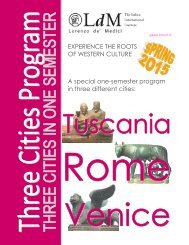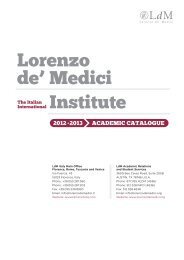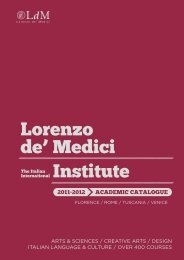aCademiC Catalog 2013-2014 - Lorenzo de Medici
aCademiC Catalog 2013-2014 - Lorenzo de Medici
aCademiC Catalog 2013-2014 - Lorenzo de Medici
You also want an ePaper? Increase the reach of your titles
YUMPU automatically turns print PDFs into web optimized ePapers that Google loves.
fresh reinterpretations of regional traditions, revaluation of local<br />
products, interest in lighter and healthier diet, and an emphasis<br />
on creativity. Driving these trends are such diverse factors as<br />
interest in other cuisines, innovations by leading chefs, and<br />
especially changes in Italian society and lifestyles. Stu<strong>de</strong>nts<br />
learn basic cooking skills as well as some specialized cooking<br />
methods and techniques. They discover how to select quality<br />
ingredients, and they compare their eating habits with those<br />
common in Italy today. Particular focus is given to the following<br />
aspects: historical origins and <strong>de</strong>velopments of food production,<br />
regional dishes, seasonal and environmental conditions, social<br />
issues, nutrition, safety and health. In each lesson stu<strong>de</strong>nts<br />
learn how to prepare representative recipes, with attention to<br />
ingredients, nutritional values, and presentation. Please note<br />
that the present course has exclusively vegetarian ingredients<br />
and dishes.<br />
Mediterranean and Middle Eastern Cuisines<br />
NUH 225 F<br />
Cr: 3; Contact hrs: 45<br />
Western cuisine owes a lot of its ingredients, foods and methods<br />
of cooking to the Middle Eastern tra<strong>de</strong> routes. This course will<br />
analyze Middle Eastern cooking and its influence on Italian and<br />
Mediterranean cuisines. Stu<strong>de</strong>nts will discover that the roots of<br />
pasta, pizza and ice cream, the most well known Italian foods,<br />
can be traced through history to the Talmud and the Arab<br />
colonies in Sicily. Stu<strong>de</strong>nts will travel virtually through North<br />
Africa, the Near Middle East (Turkey, Greece), the Arab World,<br />
Israel and Persia to get to know their traditions and something<br />
about their history and music and learn to prepare their<br />
characteristic dishes. These cuisines all use a variety of herbs<br />
and spices which were ad<strong>de</strong>d not only for taste and aroma, but<br />
also for their healing properties. In the first half of the semester<br />
topics common to all the countries will be studied, in the second<br />
half the specific countries or areas. Particular attention will be<br />
given to Mediterranean-vegetarian cuisine. The course aims to<br />
supply the main gui<strong>de</strong>lines for recognizing, un<strong>de</strong>rstanding and<br />
interpreting true Mediterranean cuisine.<br />
Topics in Nutrition: Italian Style Cooking<br />
NUH 240 F<br />
Cr: 3; Contact hrs: 45<br />
In an age of processed foods and wi<strong>de</strong>spread adulteration<br />
of the environment, the importance of good diet is essential.<br />
Appropriate use of eliminative or healing remedies may provi<strong>de</strong><br />
additional influence on dietary metabolism. Healing nutrition<br />
provi<strong>de</strong>s unique opportunities to convert food into useful<br />
nourishment. It gives dietary therapy much ad<strong>de</strong>d value. By<br />
studying the chemical structure of food and its effects on the<br />
human body’s metabolism, stu<strong>de</strong>nts are introduced to the<br />
healthy si<strong>de</strong> of Italian cuisine today, including the practical<br />
preparation of healthy dishes. The different food combinations<br />
and the way they affect digestion and metabolism will also be<br />
analyzed in or<strong>de</strong>r to plan a daily healthy diet. This course is<br />
recommen<strong>de</strong>d for everyone (vegans and vegetarians inclu<strong>de</strong>d)<br />
with an interest in nutritional methods for restoring and<br />
maintaining health.<br />
Italian Food and Culture: Pairing Food & Wine<br />
NUH 245 F<br />
Cr: 3; Contact hrs: 45<br />
Italian cuisine is the result of many different regional culinary<br />
traditions that, although merged and diluted over centuries, still<br />
maintain their particular flavors and distinct ingredients. Thanks<br />
in recent years to a greater availability of wines from different<br />
regions, the pairing of food and wine, always a traditional<br />
aspect of Italian cuisine, has become more important in the<br />
organization of a menu and the presentation of a meal. In this<br />
course the various ways of pairing Italian food and wine will be<br />
analyzed and used for menu planning. This involves research<br />
into aspects of both wine and food, with special emphasis on<br />
classification and technical terminology, nutritional and health<br />
issues, chemical composition, sensory and other evaluation<br />
techniques, as well as cooking skills that will be practiced<br />
regularly in class.<br />
The Science of Food, Health and Wellbeing<br />
NUH 249 F<br />
Cr: 3; Contact hrs: 45<br />
The primary focus of this course is to analyze the biological<br />
properties of the body and the effects that foods have on it. We<br />
will teach the basics of nutrition (proteins, vitamins, minerals,<br />
antioxidants, natural supplements) and how the phytochemicals<br />
and nutrients of foods can improve health, how to live<br />
healthily, habits that may hurt your health, how to get fit, how<br />
to get energy and programs for physical and mental release.<br />
Throughout this course stu<strong>de</strong>nts will learn about prescription<br />
for nutritional healing and gui<strong>de</strong>lines for selecting foods, and<br />
techniques and products for psycho-physical well-being. The<br />
course is recommen<strong>de</strong>d to anyone (vegans, vegetarians), with<br />
an interest in nutritional methods for restoring and maintaining<br />
health. There will be a visit to an Italian local wellness center<br />
(thermal establishment) and to a health food store, where<br />
stu<strong>de</strong>nts will be able to see a great variety of organic foods and<br />
learn to distinguish and best choose among them. During the<br />
course stu<strong>de</strong>nts will enjoy a special dinner at a characteristic<br />
organic food restaurant in Florence. The lessons inclu<strong>de</strong> the<br />
practical preparation of healthy dishes. At the end of the course<br />
stu<strong>de</strong>nts will be able to choose anything they need to live life<br />
“in shape”.<br />
Italian Cuisine: History and Practice<br />
NUH 250 F<br />
Cr: 3; Contact hrs: 45<br />
This is a study of the evolution of food in Italy, starting from<br />
ancient Roman times, continuing through the Middle Ages and<br />
the Renaissance, up to mo<strong>de</strong>rn times. Stu<strong>de</strong>nts will look at<br />
the sumptuous ancient Roman table, the simple cuisine of the<br />
medieval monasteries and the spectacular feasts of the courts.<br />
Food will be examined in the historical context of each period<br />
and in relation to the society and culture of the times. The<br />
economic prosperity and cultural vitality of the Renaissance are<br />
explored through gastronomy: natural and sophisticated tastes,<br />
culinary skills, famous cooks and their innovative recipes, table<br />
settings and the co<strong>de</strong> of manners. Particular attention will be<br />
paid to the important role of Caterina <strong>de</strong>’ <strong>Medici</strong> in exporting<br />
Tuscan cuisine to France and how it <strong>de</strong>veloped there. In Italy, as<br />
nowhere else, ancient culinary traditions have persisted. Italians<br />
still prepare and eat foods almost as they did in the fifteenth<br />
century. Stu<strong>de</strong>nts work with original recipes from past culinary<br />
treatises, sometimes discovering ancient tastes (herbs, spices,<br />
sauces), but most of the time adapting old techniques to new<br />
circumstances and ingredients. So many ancient customs have<br />
endured for such a long time. This is one of the most fascinating<br />
aspects of Italian cultural history. This course is about original<br />
Italian cuisine and its timeless qualities.<br />
Wine Business and Marketing<br />
NUH 252 F; Dual listed: BUS 252 F<br />
Cr: 3; Contact hrs: 45<br />
This course explores the business and marketing of wine, with<br />
special focus on U.S. markets. Wine tra<strong>de</strong> and consumption in<br />
the US have constantly increased in recent years. If until the<br />
early 1990’s wine consumption was concentrated in a few<br />
major states, today wine is consumed by a large part of the<br />
entire US population. Italian wine, counting for 30% of U.S. wine<br />
imports, is a major part of this economic and cultural scenario.<br />
In addition, new wine markets have emerged worldwi<strong>de</strong>. This<br />
growing interest has strengthened the role of traditional key<br />
players of the wine tra<strong>de</strong> such as importers, distributors,<br />
wholesalers, retailers, while helping to create new professional<br />
figures such as wine writers, wine club managers, and event<br />
promoters. In this course stu<strong>de</strong>nts learn skills that help equip<br />
them to take on such roles. Given the notable diversity and<br />
quality of Italian wines, stu<strong>de</strong>nts examine issues of sourcing,<br />
shipment chains and trading channels, and market impact. The<br />
course inclu<strong>de</strong>s business simulations, and stu<strong>de</strong>nts produce a<br />
start-up or marketing project.<br />
Prerequisites: BUS 130 Introduction to Business, or equivalent<br />
School of Creative Arts FLORENCE<br />
LdM Aca<strong>de</strong>mic <strong>Catalog</strong> <strong>2013</strong>-<strong>2014</strong><br />
87





